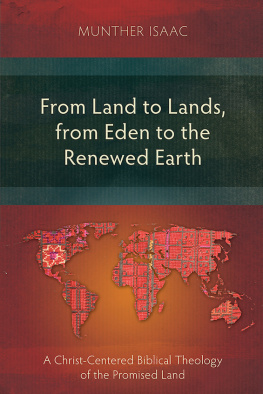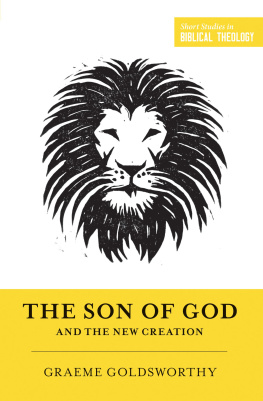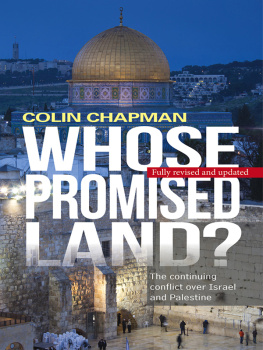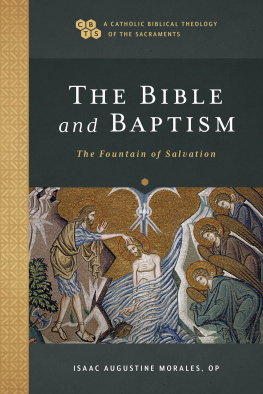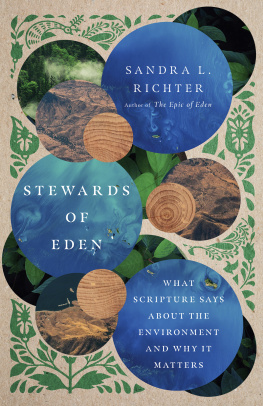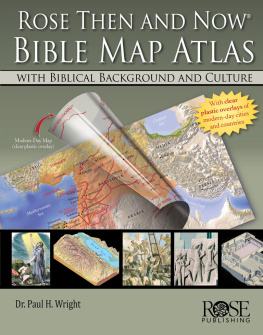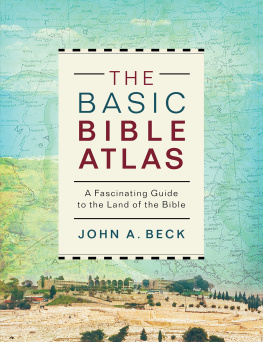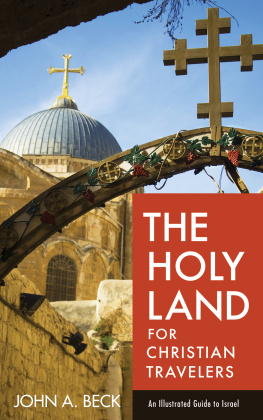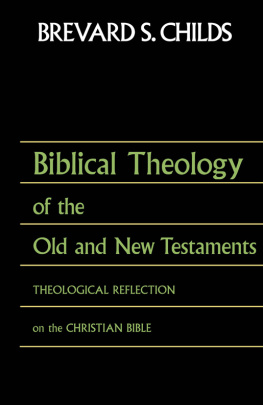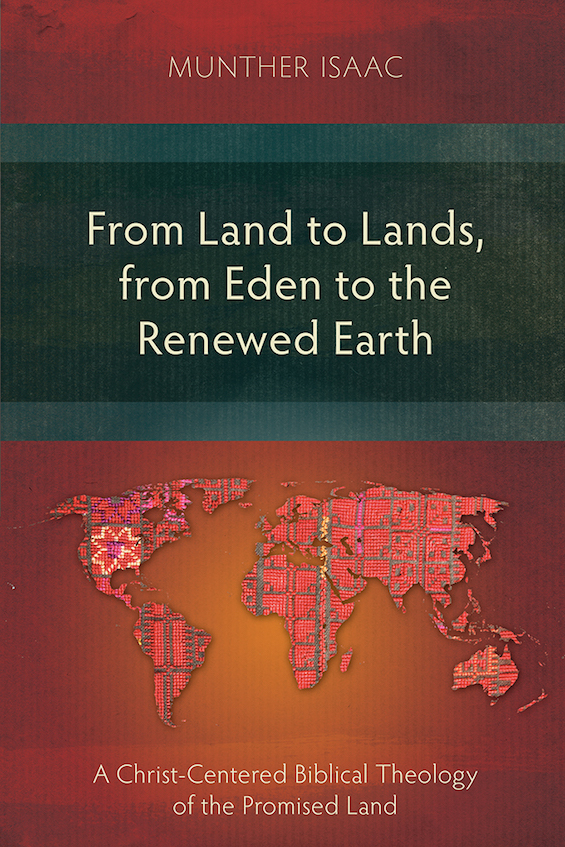This is an extraordinary book. It does not fall into the trap of playing Christian universality against Israels particularity in view of the Holy Land. It sees the unity of the Bible as a whole in regaining the universal scope of Gods particular covenant with Israel to establish justice on earth. This calls both Jews and Christians to overcome imperial conquering of land and oppression of its inhabitants in order to walk humbly with God, the giver and owner of land, to be a blessing for all peoples.
From Land to Lands, from Eden to the Renewed Earth
A Christ-Centered Biblical Theology of the Promised Land
Munther Isaac
2015 by Munther Issac
Published 2015 by Langham Monographs
an imprint of Langham Publishing
www.langhampublishing.org
Langham Publishing and its imprints are a ministry of Langham Partnership
Langham Partnership
PO Box 296, Carlisle, Cumbria, CA3 9WZ, UK
www.langham.org
ISBNs:
978-1-78368-077-1 Print
978-1-78368-092-4 Mobi
978-1-78368-093-1 ePub
978-1-78368-094-8 PDF
Munther Issac has asserted his right under the Copyright, Designs and Patents Act, 1988 to be identified as the Author of this work.
All rights reserved. No part of this publication may be reproduced, stored in a retrieval system or transmitted, in any form or by any means, electronic, mechanical, photocopying, recording or otherwise, without the prior written permission of the publisher or the Copyright Licensing Agency.
Scripture quotations are from The Holy Bible, English Standard Version (ESV), copyright 2001 by Crossway, a publishing ministry of Good News Publishers. Used by permission. All rights reserved.
British Library Cataloguing in Publication Data
A catalogue record for this book is available from the British Library
ISBN: 978-1-78368-077-1
Cover & Book Design: projectluz.com
Langham Partnership actively supports theological dialogue and a scholars right to publish but does not necessarily endorse the views and opinions set forth, and works referenced within this publication or guarantee its technical and grammatical correctness. Langham Partnership does not accept any responsibility or liability to persons or property as a consequence of the reading, use or interpretation of its published content.
Converted to eBook by EasyEPUB
To the memory of my father, who brought our family back to the land;
To my mother, who raised me up in the land;
To Rana, Mona, and Ghassan, who share with me the love of the land;
To my colleagues and students at Bethlehem Bible College, who serve with me in the land;
To the family of the Oxford Centre for Mission Studies, who were a family to me when I was away from the land;
To the Palestinian Church, the church of the land;
And mostly, to Rudaina, the love of my life, whose love and support carried and accompanied me throughout the writing of this book, and to Karam and Zaid, our precious gifts from the God of the land.
To God be the Glory
Abstract
The theology of the land must start in the garden of Eden. Eden is a sanctuary, a covenanted land, and a royal garden. Eden is proto-land, and Adam is proto-Israel. Starting in Eden underlines the universal dimension of the land promise and its conditionality. It also elevates ethical behavior above the gift.
The theology of the land in the Old Testament (OT) reflects these Edenic themes: holiness, covenant, and kingdom. First, the holiness of the land depends on the presence of God in the land, and on the holiness of its dwellers; there is no permanent holy place in the OT. Second, the land is a gift under treaty; the goal of the gift is establishing an ideal covenantal community that witnesses to other nations in other lands. Third, the land is the sphere of Gods reign on earth through his vicegerent. The vicegerent brings justice and peace to the land. God remains the ultimate king in the land. The original promise to Israel is a promise of universal dominion.
After the exile, the prophets spoke of a time in which the land would become an ideal place. This ideal land is, effectively, Eden restored. The restoration of the land ultimately points forward to the restoration of the earth. The land in the OT underlines the social dimension to redemption. Yet, importantly, Israels faith can survive without the land.
The Jesus-event is the starting place for the theology of the land in the New Testament (NT). Jesus restored Israel and fulfilled the promises of the OT, including the land. He embodied the holy presence of God on earth, kept the covenant on behalf of Israel, and brought the reign of God on earth. He inherited the land, and in him Jews and Gentiles are its true heirs. This radical new fulfillment, brought about by the Jesus-event, dramatically changed the meaning of the land and nullified the old promises in their old articulation. The NT points forward to a time of consummation when the whole earth will become an ideal place or a redeemed land.
The land has thus been universalized in Christ. Universalization does not mean the spiritualization or heavenization. Instead, the theology of the land of Israel modified in the Jesus-event is a paradigm for Christian communities living in other lands. The theology of the land thus underlines the social and territorial dimensions of redemption. It also highlights the goodness of creation, and has many practical implications for the ongoing mission and practice of the church throughout the world.
Introduction
A Biblical Theology of the Land
Land is a central, if not the central, theme of biblical faith.
The fate of the land is the focal point of biblical historiography.
Biblical Theology
The land is an important theme in the Bible. It is a theme through which the whole biblical history contained in both the Old and New Testaments can be studied and analyzed. When it comes to the Old Testament (OT), it is no exaggeration to say that the land is the central theme in the narrative of Israel. This study is a biblical theological study of the land. Biblical theology can be defined as:
A branch of theological inquiry devoted to identifying distinctive themes in various sections of the Bible... tracing them from one section to another, and discovering any overall unifying theme that draws the whole Bible together.
This study, simply put, will trace the theme of the land from one section of the Bible to another, and will attempt to discover any overall unifying themes in the theology of the land that draw the Bible together. The assumption that there are unifying themes in the Bible is essential to biblical theology. Biblical theology is concerned to describe the inner unity of the Bible on its own terms. Yet this does not mean that the Bible by design has only one major unifying theme, or that there is a theological uniformity that runs through every section of the Bible. The diversity of the theologies that are contained in the Bible is well acknowledged:

